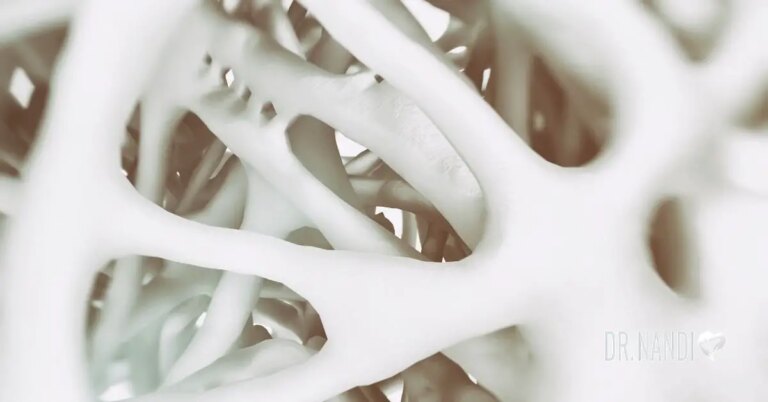Vitamin D reacts with receptors throughout the body. Most vitamin D is produced in the skin through sunlight exposure, and about 10% of it comes from food as part of a healthy, well-balanced diet.
This vitamin is well-known for its involvement in calcium, bone metabolism, and bone integrity, but recent research discovered it has more functions than just that.
The Link Between Vitamin D Deficiency and Dementia
According to new research published in The American Journal of Clinical Nutrition, supported by the National Health and Medical Research, low vitamin D levels may play a role in dementia development. This is especially interesting when you consider how common vitamin D deficiency is in older adults and how important it is to identify modifiable risk factors for dementia. [1]
The study examined data from 294,514 people ages 37 to 73 in the UK Biobank to determine the impact of low vitamin D levels and the risk of dementia and stroke. They used Nonlinear Mendelian randomization (MR), which examines the causative influence of a modifiable exposure on the disease. It uses measured gene variation to test for underlying causality for neuroimaging results, dementia, and stroke.
In this study, those with the lowest vitamin D concentration had the highest dementia risk. The findings were consistent in both observational and MR studies.
Vitamin D deficiency was linked to an increased risk of dementia and stroke. The highest links were found in those with levels less than 25 nanomoles per liter or nmol/L. Low vitamin D levels were connected with dementia but not with the risk of stroke in other studies that looked at probable reasons.
Participants with low vitamin D levels of 25 nmol/L were 54% found to be more likely to get dementia than those with normal vitamin D levels at 50 nmol/L.
The study concluded that:
- Low vitamin D levels are linked to lower brain volumes and an increased risk of dementia and stroke.
- Genetic studies supported a link between vitamin D insufficiency and dementia.
- Increasing everyone’s vitamin D levels to normal could prevent up to 17% of dementia cases in some populations.

Could Vitamin D Deficiency Lead to Dementia?
While it is possible, additional research is required to confirm the link between low vitamin D levels and the risk of dementia. Even though a link was identified, it does not prove causality.
There is a need for further studies to replicate the findings and include a more comprehensive range of diverse populations to learn more about the association between vitamin D levels and dementia.
Australian Centre for Precision Health Director at UniSA, Professor Elina Hyppönen, commenting on the research, said: “Until now, it has been very difficult to examine what would happen if we were able to prevent vitamin D deficiency. If we’re able to change this reality [by] ensuring that none of us is severely vitamin D deficient, it would also have further benefits and we could change the health and wellbeing [of] thousands.” [2]
The findings could lead to more studies to see if vitamin D supplements could delay or prevent dementia in older people. We hope this could lead us closer to early diagnosis and prevention of dementia.
Although we know that low vitamin D levels are linked to brain function, we do not know whether high or optimal levels will reduce cognitive impairments. It is also unclear whether providing vitamin D to deficient persons can help them regain some of these functions.
Vitamin D in Brain Health
Scientists have connected the vitamin to various disorders, including cardiovascular disease, autoimmune disorders, inflammatory diseases, cancer, stroke, metabolic problems, and diabetes. Cognitive impairment, mood disorders, obsessive compulsiveness, dementia, psychosis, and autism have recently been added to the list. [3]
Vitamin D is rapidly becoming recognized as an essential neuro-steroid having a variety of functions in the brain. To further explain the connection between vitamin D and brain health, the liver and the kidney convert the vitamin D we take into the active hormone calcitriol.
Calcitriol is the active form of vitamin D that mediates its effects by binding to the vitamin D receptors (VDR). Our VDRs regulate the expression of more than 900 genes involved in many physiological functions that signal our immune function, calcium balance, and brain function. [4]
More on Vitamin D Receptors
Nearly all cells in the body react to vitamin D, and a lot of our cells require this vitamin to perform their tasks efficiently. Many cells in our brain need vitamin D to play essential roles to protect our brain from deterioration.
Vitamin D receptors are found throughout the brain, especially in memory-related areas such as the hippocampus and dentate gyrus.
Similarly, the enzyme 1-hydroxylase, which synthesizes the active form of vitamin D, is produced in numerous cerebral areas. The active form of vitamin D, 1,25-D3 (1,25-D3), influences neurotrophin expression, including nerve growth factor, neurotrophin 3, and glial-derived neurotrophic factor, as well as neural cell survival, development, and function. [4]
Vitamin D stimulates macrophages, increasing the clearance of amyloid plaques, a characteristic of Alzheimer’s disease. It also decreases amyloid-induced cytotoxicity and death in primary cortical neurons, which are beneficial to thought, memory, language, etc. [5]

Age-Related Vitamin D Deficiency and Dementia
Despite it being known as a “sunshine vitamin,” around 42% of the US population is vitamin D deficient. Some, like menopausal women, those with poor nutrition habits, and people over age 65, have even higher levels of vitamin D deficiency.
The older population is at an exceedingly high risk of vitamin D deficiency due to decreased production from the skin and dietary intake. Since vitamin D has neuroprotective effects and vitamin D receptors are abundant in the brain tissue, as well as based on the studies mentioned above, we can infer that there is a possible risk of dementia if the human body does not produce enough for the body.
Furthermore, the likelihood of developing dementia has been known to increase with age, which causes impairment and dependency among older people. This chronic syndrome causes cognitive functions to deteriorate and affects quite a large number—more than 55 million individuals worldwide, with 10 million new cases diagnosed yearly. [8]
That’s double the trouble.
Stepping Up Your Vitamin D Intake
At the end of the day, vitamin D deficiency is one of the many risk factors for dementia and needs to be taken in a broader context.
Getting enough vitamin D is essential for your health, whether you are at risk for dementia or not.
The National Institutes of Health (NIH) says that most people should get 400–800 IU or 10–20 micrograms of vitamin D every day. Some studies show that the daily dose needs to be higher if you don’t spend much time in the sun or have darker skin. [9]
If you’re already taking vitamin D supplements and getting enough sun–get your vitamin D levels up to where they should be by adding vitamin D-rich food to your diet. Receive a free copy of our Superfood Cookbook with access to over 60 easy recipes. Plan your meals stress-free!

Sources:
- Vitamin D and brain health: an observational and Mendelian randomization study | The American Journal of Clinical Nutrition | Oxford Academic
- Vitamin D Deficiency Leads to Dementia – Neuroscience News
- The Role of Vitamin D in Brain Health: A Mini Literature Review – PMC
- The Vitamin D Receptor and T Cell Function – PMC
- Vitamin D: Brain and Behavior – PMC
- The power of vitamin D: What experts already know (and are still learning) about the ‘sunshine vitamin’ – UTHealth News
- The Role of Vitamin D in the Aging Adult – PMC
- Dementia | World Health Organization
- Vitamin D – Health Professional Fact Sheet




















